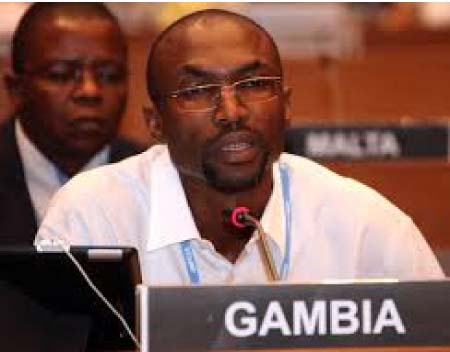
The objective of the sensitisation exercise on the final EIA regulations was to create awareness of the importance of conducting environmental impact assessment and the need for adherence to guidelines and procedures in The Gambia in line with the provision of National Environment Act 1994.
This followed the recent endorsement of the EIA regulations by the chairman of the National Environment Management Council, President Yahya Jammeh.
In his remarks, the Minister of Environment, Climate Change, Water Resources and Wildlife, Pa Ousman Jarju, said all are aware of the dramatic changes that have taken place in our environment, such as the beaches, farmlands, forests and the climate, among others, over recent years.
The resulting decline in economic gain due to these environmental stresses are well known, he added.
According to Mr. Jarju, the loss of vegetation and forests has left tracts of land almost bare, enabling wind to freely blow away the topsoil, thus adversely affecting agriculture and food security.
“In the coastal areas, the sea is eating away our once wild and beautiful beaches, threatening hotels, private homes, roads and cemeteries,” Minister Jarju continued.
The objective of the EIA in The Gambia is to aid decision-making and form an integral part of information used for that purpose, he added.
Minister Jarju noted that EIA is important as it looks into interrelated issues, which are necessary to complement the economic, technical and social issues.
He said protection and quality has improved, because of the EIA which aims at preventing or controlling negative impact, particularly irreversible ones.
The Gambia government over the years adopted several measures to arrest the decline, and to improve the environment, he went on.
Its take direct focus on the people to change some of their own habits and attitudes and to begin to take more adequate care of the environment, he further stated.
According to Minister Jarju, the policy framework for environment management within the government policy for sustained development is provided by the Gambia Environmental Action Plan (GEAP) - GEAP1, 1992 to 2001 and GEAP2, 2010 to 2018.
The GEAPs’ main policy objective is to guide development such that the rational sustainable utilization of natural resources is ensured, and the sound management of the environment and wise use of natural resources has now come to be center-stage, the environment minister said.
In the light of environmental degradation, Minister Jarju noted, it has become imperative to come up with an appropriate national institution and legal framework to ensure the protection of the environment.
The environment impact assessment, therefore, became a statutory requirement project and plan with the enactment in 1994 of the national environment management Act, he added.
He said the Gambia EIA regulation 2014 has now been finalized, thus the need to sensitize police-makers and other relevant stakeholders.
It was, therefore, prudent if NAMS are sensitized, citing the invaluable role they continue to play in all sectors of development in this country.
This revised EIA Regulation 2014 has addressed the issues required for successful and effective implementation of the EIA system in line with both national and international regulations and procedures for environmental protection, he added.
The knowledge of empathy with the environment and the EIA process would be invaluable in ensuring that sound decisions are made in the selection of criteria to influence the development of The Gambia.
This process requires the participation of all stakeholders, both public and private and their presence in the sensitization meetings on this legal document, meant for the protection and preservation of our threatened environment, for both the present and future generations in The Gambia to make a positive impact.


